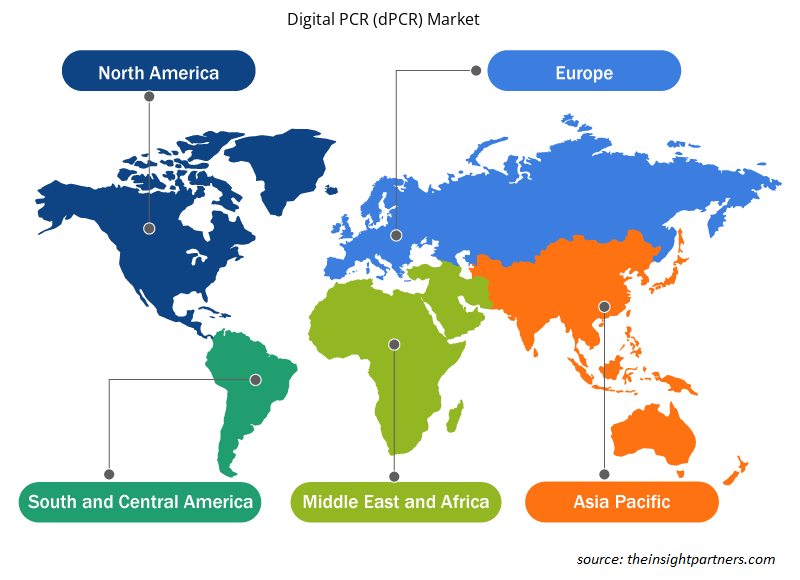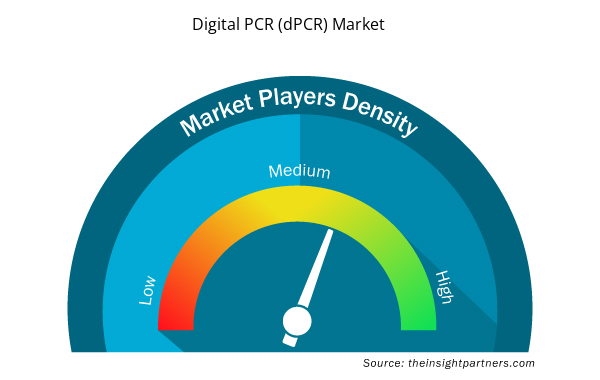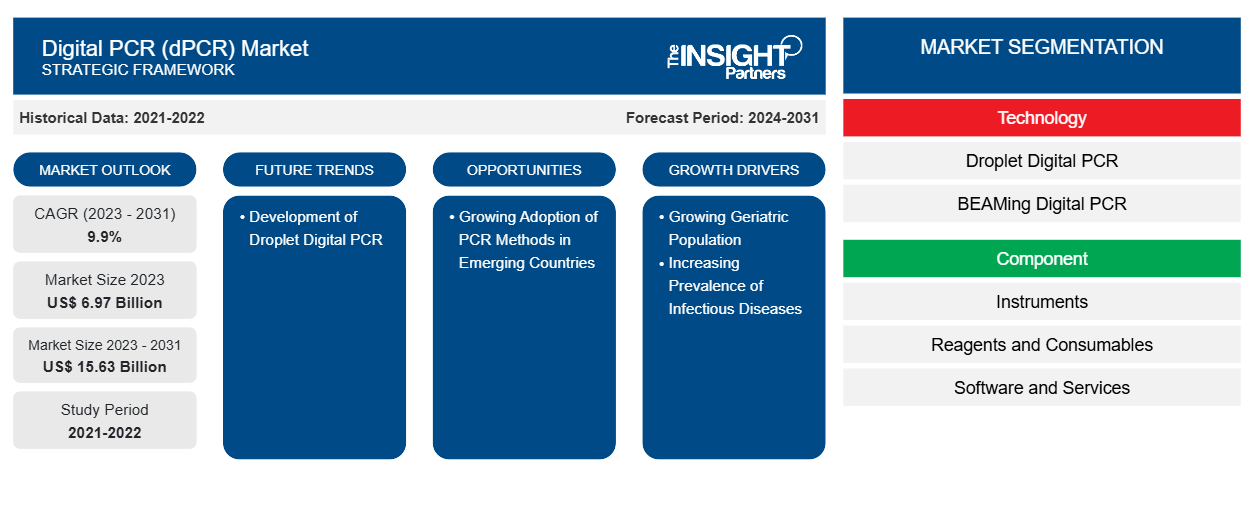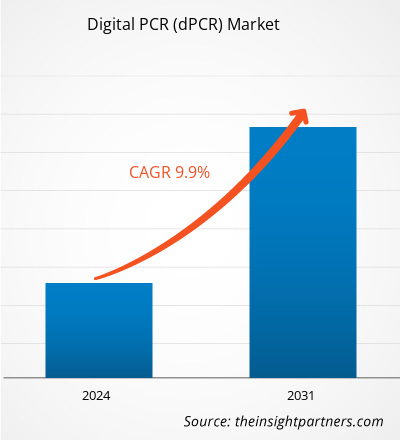من المتوقع أن يصل حجم سوق تقنية تفاعل البوليميراز المتسلسل الرقمي (dPCR) إلى 15.63 مليار دولار أمريكي بحلول عام 2031 من 6.97 مليار دولار أمريكي في عام 2023؛ ومن المتوقع أن يسجل السوق معدل نمو سنوي مركب بنسبة 9.9٪ خلال الفترة 2023-2031.
dPCR هي تقنية رائدة توفر تحديد كمية الأحماض النووية بدقة فائقة وبشكل مطلق. إنها واحدة من أكثر التقنيات دقة وحساسية للكشف عن تسلسلات الأحماض النووية المحددة. لقد أصبحت أداة حاسمة وموثوقة للتحليل الجزيئي. إن زيادة حالات الأمراض الوراثية والمعدية التي يمكن تشخيصها وعلاجها باستخدام تقنيات dPCR تدعم نمو سوق Digital PCR (dPCR) . تتضمن اتجاهات سوق Digital PCR (dPCR) التطورات التكنولوجية التي تساعد في التحديد الكمي عالي الدقة والمطلق لجزيئات الحمض النووي المستهدفة، وبالتالي تمكين مجموعة واسعة من التطبيقات في التشخيص والبحث.
محركات النمو:
يُعد تخليق الجينات الأداة الأكثر قبولًا في مجال تقنية الحمض النووي المؤتلف. في تخليق الجينات، تُستخدم تقنية التعبير عن البروتين المؤتلف وتقنية dPCR لأغراض التضخيم وكذلك القياس الكمي. في عام 2021، أكملت Camena Bioscience، وهي شركة ناشئة في مجال البيولوجيا الاصطناعية تزود صناعات التكنولوجيا الحيوية والأدوية بالجينات، جولة تمويل من الفئة A بقيمة 10 ملايين دولار أمريكي برئاسة Mercia. باستخدام الأموال الإضافية، تخطط الشركة لتوسيع عملياتها وتعزيز جهودها لتطوير gSynth، منصة تخليق الحمض النووي الرائدة. تساعد منصة التكنولوجيا والموارد الأخرى ذات الصلة الشركة على تسريع تطوير تخليق الجينات.
في عام 2020، أعلنت شركة EVONETIX LTD، وهي شركة ناشئة في مجال البيولوجيا الاصطناعية تعمل على إنشاء منصة سطح مكتب لتخليق الجينات بسرعة ودقة عالية وقابلة للتطوير، عن استكمال جولتها التمويلية من الفئة B. وقد جمعت الشركة، بقيادة Foresite Capital (مستثمر جديد)، 30 مليون دولار أمريكي (23 مليون جنيه إسترليني) في هذه الجولة. وبالتالي، فإن الاستثمارات المتزايدة من قبل الشركات تغذي نمو سوق تخليق الجينات، وبالتالي تساهم في نمو سوق تفاعل البوليميراز المتسلسل الرقمي (dPCR).
قم بتخصيص هذا التقرير ليناسب متطلباتك
ستحصل على تخصيص لأي تقرير - مجانًا - بما في ذلك أجزاء من هذا التقرير، أو تحليل على مستوى الدولة، وحزمة بيانات Excel، بالإضافة إلى الاستفادة من العروض والخصومات الرائعة للشركات الناشئة والجامعات
- احصل على أهم اتجاهات السوق الرئيسية لهذا التقرير.ستتضمن هذه العينة المجانية تحليلاً للبيانات، بدءًا من اتجاهات السوق وحتى التقديرات والتوقعات.
تقسيم التقرير ونطاقه:
تم إجراء تحليل سوق Digital PCR (dPCR) من خلال النظر في القطاعات التالية: التكنولوجيا، والمكونات، والتطبيق، والمستخدم النهائي، والجغرافيا. بناءً على التكنولوجيا، يتم تقسيم السوق إلى Droplet Digital PCR (ddPCR) وBEAMing digital PCR. من حيث المكون، يتم تصنيف السوق إلى أدوات وكواشف ومواد استهلاكية وبرامج وخدمات. بناءً على التطبيق، يتم تصنيف السوق إلى سريرية وبحثية وطب شرعي. يغطي النطاق الجغرافي لتقرير سوق Digital PCR (dPCR) أمريكا الشمالية (الولايات المتحدة وكندا والمكسيك) وأوروبا (فرنسا وألمانيا والمملكة المتحدة وإسبانيا وإيطاليا وبقية أوروبا) وآسيا والمحيط الهادئ (الصين واليابان والهند وكوريا الجنوبية وأستراليا وبقية آسيا والمحيط الهادئ) والشرق الأوسط وأفريقيا (المملكة العربية السعودية وجنوب إفريقيا والإمارات العربية المتحدة وبقية الشرق الأوسط وأفريقيا) وأمريكا الجنوبية والوسطى (البرازيل والأرجنتين وبقية أمريكا الجنوبية والوسطى).
التحليل القطاعي:
يتم تصنيف سوق تفاعل البوليميراز المتسلسل الرقمي (dPCR)، حسب المنتج، إلى تفاعل البوليميراز المتسلسل الرقمي بالقطرات (ddPCR) وتفاعل البوليميراز المتسلسل الرقمي بالحزم (BEAMing). احتل قطاع تفاعل البوليميراز المتسلسل الرقمي بالقطرات (ddPCR) حصة سوقية كبيرة في عام 2023. ومن المتوقع أن يسجل أعلى معدل نمو سنوي مركب في السوق خلال الفترة 2023-2031.
بناءً على المكون، يتم تصنيف السوق إلى أدوات وكواشف ومواد استهلاكية ومؤشرات البرامج والخدمات. احتل قطاع الكواشف والمواد الاستهلاكية حصة سوقية كبيرة في عام 2023، ومن المتوقع أن يسجل أعلى معدل نمو سنوي مركب خلال الفترة 2023-2031.
بناءً على التطبيق، يتم تقسيم السوق إلى سريري وبحثي وطب شرعي. احتل القطاع السريري حصة كبيرة في سوق تفاعل البوليميراز المتسلسل الرقمي (dPCR) في عام 2023؛ ومن المتوقع أن يسجل أعلى معدل نمو سنوي مركب خلال الفترة 2023-2031.
بناءً على المستخدم النهائي، يتم تقسيم السوق إلى المستشفيات ومراكز التشخيص، وشركات الأدوية والتكنولوجيا الحيوية، ومختبرات الأبحاث والمعاهد الأكاديمية، ومختبرات الطب الشرعي، ومنظمات الأبحاث السريرية. احتل قطاع المستشفيات ومراكز التشخيص حصة كبيرة في سوق تفاعل البوليميراز المتسلسل الرقمي (dPCR) في عام 2023؛ ومن المتوقع أن يسجل أعلى معدل نمو سنوي مركب خلال الفترة 2023-2031.
التحليل الإقليمي:
من حيث الجغرافيا، تم تقسيم سوق تفاعل البوليميراز المتسلسل الرقمي (dPCR) إلى أمريكا الشمالية وأوروبا ومنطقة آسيا والمحيط الهادئ وأمريكا الجنوبية والوسطى والشرق الأوسط وأفريقيا. في عام 2023، استحوذت أمريكا الشمالية على حصة كبيرة من السوق. في عام 2023، هيمنت الولايات المتحدة على السوق في هذه المنطقة. يُعزى نمو سوق تفاعل البوليميراز المتسلسل الرقمي (dPCR) في أمريكا الشمالية إلى المؤتمرات العلمية وورش العمل والأحداث التي أقيمت في الولايات المتحدة وكندا، والتي تساعد المشاركين من مختلف أنحاء العالم على تبادل الاتجاهات وأحدث نتائج البحث القائمة على تفاعل البوليميراز المتسلسل. على سبيل المثال، أجرت Global Engage التابعة لشركة Global Information Incorporation قمة لمدة يومين تضمنت مساهمة العلماء في جميع أنحاء العالم في استراتيجيات وتطوير تفاعل البوليميراز المتسلسل الرقمي (dPCR) بالإضافة إلى مناقشة دراسات الحالة التي تنطوي على مساهمة تفاعل البوليميراز المتسلسل الرقمي (dPCR) في الرعاية الصحية. كما أن المشاركة النشطة للبلد هي أحد العوامل الدافعة التي تؤدي إلى نمو المنطقة في سوق تفاعل البوليميراز المتسلسل الرقمي العالمي (dPCR) في المنطقة.
تطورات الصناعة والفرص المستقبلية:
يتضمن تقرير سوق تفاعل البوليميراز المتسلسل الرقمي (dPCR) تحديد موقع الشركة وتركيزها لتقييم أداء المنافسين في السوق. وفقًا للبيانات الصحفية للشركة، تم ذكر بعض المبادرات التي اتخذتها الجهات الفاعلة الرئيسية العاملة في السوق أدناه:
- في يوليو 2023، أطلقت شركة Bio-Rad Laboratories, Inc. أول اختبار dPCR متعدد الإرسال فائق الحساسية - مجموعة الكشف عن الطفرات ddPLEX ESR1. مع إطلاق هذا المنتج، تخطط الشركة لتوسيع نطاق توفر عرض ddPCR لسوق الأورام، حيث تساعد اختبارات الكشف عن الطفرات متعددة الإرسال وشديدة الحساسية في البحث الانتقالي واختيار العلاج ومراقبة المرض.
- في يونيو 2021، قدمت شركة Bio-Rad Laboratories Inc. "مجموعة قياس انتشار فيروس SARS-CoV-2 في مياه الصرف الصحي"، وهي أداة حساسة وفعالة من حيث التكلفة ودقيقة للكشف عن فيروس SARS-CoV-2 في مياه الصرف الصحي المجتمعية.
- توصي مراكز السيطرة على الأمراض والوقاية منها (CDC) باستخدام تقنيات ddPCR لاختبار مياه الصرف الصحي، ونشرت وكالة حماية البيئة (EPA) هذه التكنولوجيا كطريقة موثوقة لقياس كمية الفيروسات في مياه الصرف الصحي.
رؤى إقليمية حول سوق تقنية تفاعل البوليميراز المتسلسل الرقمي (dPCR)
لقد قام المحللون في Insight Partners بشرح الاتجاهات والعوامل الإقليمية المؤثرة على سوق Digital PCR (dPCR) طوال فترة التوقعات بشكل شامل. يناقش هذا القسم أيضًا قطاعات سوق Digital PCR (dPCR) والجغرافيا في جميع أنحاء أمريكا الشمالية وأوروبا ومنطقة آسيا والمحيط الهادئ والشرق الأوسط وأفريقيا وأمريكا الجنوبية والوسطى.

- احصل على البيانات الإقليمية المحددة لسوق تفاعل البوليميراز المتسلسل الرقمي (dPCR)
نطاق تقرير سوق تقنية تفاعل البوليميراز المتسلسل الرقمي (dPCR)
| سمة التقرير | تفاصيل |
|---|---|
| حجم السوق في عام 2023 | 6.97 مليار دولار أمريكي |
| حجم السوق بحلول عام 2031 | 15.63 مليار دولار أمريكي |
| معدل النمو السنوي المركب العالمي (2023 - 2031) | 9.9% |
| البيانات التاريخية | 2021-2022 |
| فترة التنبؤ | 2024-2031 |
| القطاعات المغطاة | حسب التكنولوجيا
|
| المناطق والدول المغطاة | أمريكا الشمالية
|
| قادة السوق وملفات تعريف الشركات الرئيسية |
|
كثافة اللاعبين في سوق تفاعل البوليميراز المتسلسل الرقمي (dPCR): فهم تأثيره على ديناميكيات الأعمال
يشهد سوق تفاعل البوليميراز المتسلسل الرقمي (dPCR) نموًا سريعًا، مدفوعًا بالطلب المتزايد من المستخدم النهائي بسبب عوامل مثل تفضيلات المستهلكين المتطورة والتقدم التكنولوجي والوعي المتزايد بفوائد المنتج. ومع ارتفاع الطلب، تعمل الشركات على توسيع عروضها والابتكار لتلبية احتياجات المستهلكين والاستفادة من الاتجاهات الناشئة، مما يؤدي إلى زيادة نمو السوق.
تشير كثافة اللاعبين في السوق إلى توزيع الشركات أو المؤسسات العاملة في سوق أو صناعة معينة. وهي تشير إلى عدد المنافسين (اللاعبين في السوق) الموجودين في مساحة سوق معينة نسبة إلى حجمها أو قيمتها السوقية الإجمالية.
الشركات الرئيسية العاملة في سوق تقنية تفاعل البوليميراز المتسلسل الرقمي (dPCR) هي:
- شركة ثيرمو فيشر العلمية
- شركة ف. هوفمان لاروش المحدودة
- كياجن
- شركة أكارا بيو
- شركة اجيلنت للتكنولوجيا
إخلاء المسؤولية : الشركات المذكورة أعلاه ليست مرتبة بأي ترتيب معين.

- احصل على نظرة عامة على أهم اللاعبين الرئيسيين في سوق تفاعل البوليميراز المتسلسل الرقمي (dPCR)
المنافسة والشركات الرئيسية:
يمكن أن تساعد توقعات سوق تفاعل البوليميراز المتسلسل الرقمي (dPCR) أصحاب المصلحة في التخطيط لاستراتيجيات النمو الخاصة بهم. تعد Thermo Fisher Scientific, Inc.؛ F. Hoffmann-la Roche Ltd.؛ QIAGEN؛ Akara bio, Inc.؛ Agilent Technologies, Inc.؛ Biomerieux SA؛ Abbott Laboratories؛ Merck KgaA؛ Promega Corporation؛ وBD من بين اللاعبين البارزين في السوق. تركز هذه الشركات على تقديم منتجات عالية التقنية جديدة، والتقدم في المنتجات الحالية، والتوسع الجغرافي لتلبية الطلب المتزايد من المستهلكين في جميع أنحاء العالم.
- التحليل التاريخي (سنتان)، السنة الأساسية، التوقعات (7 سنوات) مع معدل النمو السنوي المركب
- تحليل PEST و SWOT
- حجم السوق والقيمة / الحجم - عالميًا وإقليميًا وقطريًا
- الصناعة والمنافسة
- مجموعة بيانات Excel



Report Coverage
Revenue forecast, Company Analysis, Industry landscape, Growth factors, and Trends

Segment Covered
This text is related
to segments covered.

Regional Scope
North America, Europe, Asia Pacific, Middle East & Africa, South & Central America

Country Scope
This text is related
to country scope.
الأسئلة الشائعة
dPCR is a new technique utilized for DNA amplification and quantification that uses molecular counting protocol. dPCR is usually used to distinguish the expression of alleles, track viral infection to individual bacterial cells, quantify cancer genes, and detect fetal DNA in circulating blood.
The Digital PCR (dPCR) market is expected to be valued at US$ 15.63 billion by 2031.
The global Digital PCR (dPCR) market is segmented based on technology, component, application, and end user. The Digital PCR (dPCR) market, by component, is categorized into instruments, reagents and consumables, and software and services. The reagents and consumables segment held a significant market share in 2023 and is anticipated to record the highest CAGR in the market during 2023–2031.
The factors driving the growth of the Digital PCR (dPCR) market include the rising incidence of infectious diseases and technological advancements in PCR technologies. However, the high costs of PCR systems, hampers the growth of the Digital PCR (dPCR) market.
The Digital PCR (dPCR) market was valued at US$ 6.97 billion in 2023.
The Digital PCR (dPCR) market majorly consists of the players, including Thermo Fisher Scientific, Inc.; F. Hoffmann-la Roche Ltd.; QIAGEN; Akara bio, Inc.; Agilent Technologies, Inc.; Biomerieux SA; Abbott Laboratories; Merck KgaA; Promega Corporation; and BD.
Trends and growth analysis reports related to Life Sciences : READ MORE..
The List of Companies - Digital PCR (dPCR) Market
- Thermo Fisher Scientific, Inc.
- F. Hoffmann-la Roche Ltd
- QIAGEN
- Akara bio, Inc.
- Agilent Technologies, Inc.
- Biomerieux SA
- Abbott Laboratories
- Merck KgaA
- Promega Corporation
- BD.
The Insight Partners performs research in 4 major stages: Data Collection & Secondary Research, Primary Research, Data Analysis and Data Triangulation & Final Review.
- Data Collection and Secondary Research:
As a market research and consulting firm operating from a decade, we have published and advised several client across the globe. First step for any study will start with an assessment of currently available data and insights from existing reports. Further, historical and current market information is collected from Investor Presentations, Annual Reports, SEC Filings, etc., and other information related to company’s performance and market positioning are gathered from Paid Databases (Factiva, Hoovers, and Reuters) and various other publications available in public domain.
Several associations trade associates, technical forums, institutes, societies and organization are accessed to gain technical as well as market related insights through their publications such as research papers, blogs and press releases related to the studies are referred to get cues about the market. Further, white papers, journals, magazines, and other news articles published in last 3 years are scrutinized and analyzed to understand the current market trends.
- Primary Research:
The primarily interview analysis comprise of data obtained from industry participants interview and answers to survey questions gathered by in-house primary team.
For primary research, interviews are conducted with industry experts/CEOs/Marketing Managers/VPs/Subject Matter Experts from both demand and supply side to get a 360-degree view of the market. The primary team conducts several interviews based on the complexity of the markets to understand the various market trends and dynamics which makes research more credible and precise.
A typical research interview fulfils the following functions:
- Provides first-hand information on the market size, market trends, growth trends, competitive landscape, and outlook
- Validates and strengthens in-house secondary research findings
- Develops the analysis team’s expertise and market understanding
Primary research involves email interactions and telephone interviews for each market, category, segment, and sub-segment across geographies. The participants who typically take part in such a process include, but are not limited to:
- Industry participants: VPs, business development managers, market intelligence managers and national sales managers
- Outside experts: Valuation experts, research analysts and key opinion leaders specializing in the electronics and semiconductor industry.
Below is the breakup of our primary respondents by company, designation, and region:

Once we receive the confirmation from primary research sources or primary respondents, we finalize the base year market estimation and forecast the data as per the macroeconomic and microeconomic factors assessed during data collection.
- Data Analysis:
Once data is validated through both secondary as well as primary respondents, we finalize the market estimations by hypothesis formulation and factor analysis at regional and country level.
- Macro-Economic Factor Analysis:
We analyse macroeconomic indicators such the gross domestic product (GDP), increase in the demand for goods and services across industries, technological advancement, regional economic growth, governmental policies, the influence of COVID-19, PEST analysis, and other aspects. This analysis aids in setting benchmarks for various nations/regions and approximating market splits. Additionally, the general trend of the aforementioned components aid in determining the market's development possibilities.
- Country Level Data:
Various factors that are especially aligned to the country are taken into account to determine the market size for a certain area and country, including the presence of vendors, such as headquarters and offices, the country's GDP, demand patterns, and industry growth. To comprehend the market dynamics for the nation, a number of growth variables, inhibitors, application areas, and current market trends are researched. The aforementioned elements aid in determining the country's overall market's growth potential.
- Company Profile:
The “Table of Contents” is formulated by listing and analyzing more than 25 - 30 companies operating in the market ecosystem across geographies. However, we profile only 10 companies as a standard practice in our syndicate reports. These 10 companies comprise leading, emerging, and regional players. Nonetheless, our analysis is not restricted to the 10 listed companies, we also analyze other companies present in the market to develop a holistic view and understand the prevailing trends. The “Company Profiles” section in the report covers key facts, business description, products & services, financial information, SWOT analysis, and key developments. The financial information presented is extracted from the annual reports and official documents of the publicly listed companies. Upon collecting the information for the sections of respective companies, we verify them via various primary sources and then compile the data in respective company profiles. The company level information helps us in deriving the base number as well as in forecasting the market size.
- Developing Base Number:
Aggregation of sales statistics (2020-2022) and macro-economic factor, and other secondary and primary research insights are utilized to arrive at base number and related market shares for 2022. The data gaps are identified in this step and relevant market data is analyzed, collected from paid primary interviews or databases. On finalizing the base year market size, forecasts are developed on the basis of macro-economic, industry and market growth factors and company level analysis.
- Data Triangulation and Final Review:
The market findings and base year market size calculations are validated from supply as well as demand side. Demand side validations are based on macro-economic factor analysis and benchmarks for respective regions and countries. In case of supply side validations, revenues of major companies are estimated (in case not available) based on industry benchmark, approximate number of employees, product portfolio, and primary interviews revenues are gathered. Further revenue from target product/service segment is assessed to avoid overshooting of market statistics. In case of heavy deviations between supply and demand side values, all thes steps are repeated to achieve synchronization.
We follow an iterative model, wherein we share our research findings with Subject Matter Experts (SME’s) and Key Opinion Leaders (KOLs) until consensus view of the market is not formulated – this model negates any drastic deviation in the opinions of experts. Only validated and universally acceptable research findings are quoted in our reports.
We have important check points that we use to validate our research findings – which we call – data triangulation, where we validate the information, we generate from secondary sources with primary interviews and then we re-validate with our internal data bases and Subject matter experts. This comprehensive model enables us to deliver high quality, reliable data in shortest possible time.


 احصل على عينة مجانية لهذا التقرير
احصل على عينة مجانية لهذا التقرير